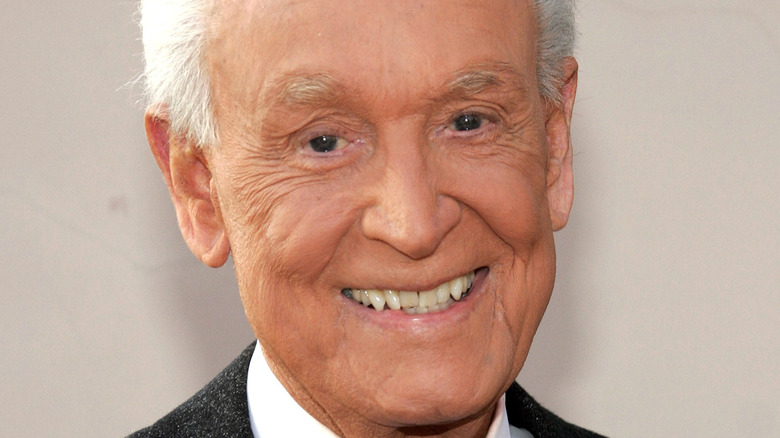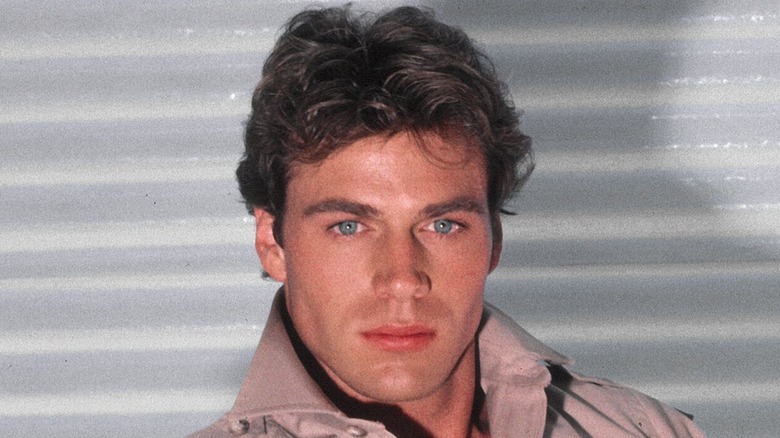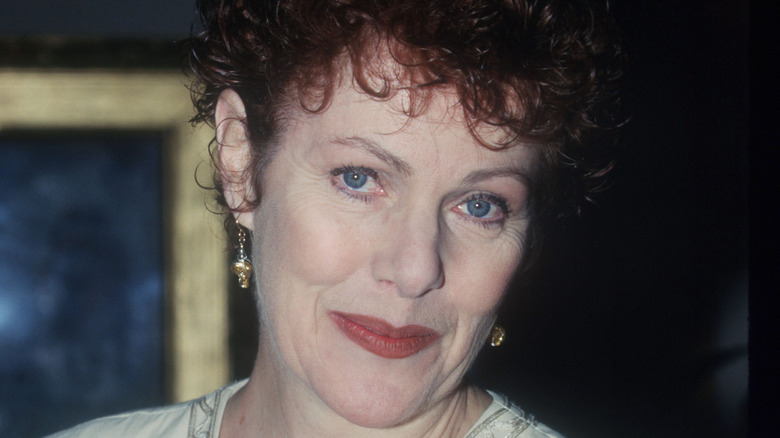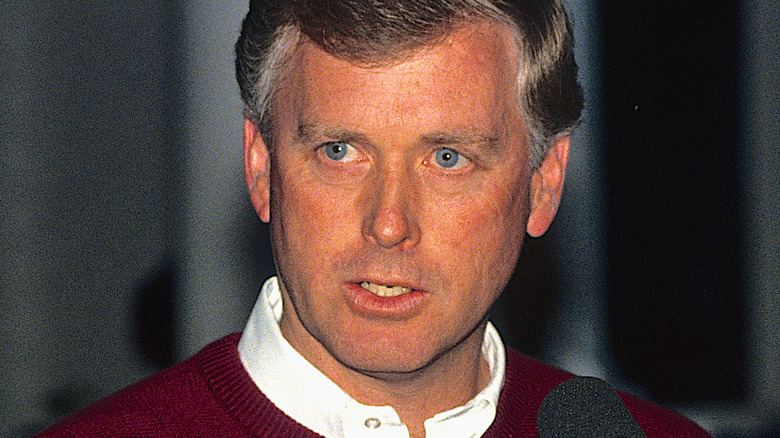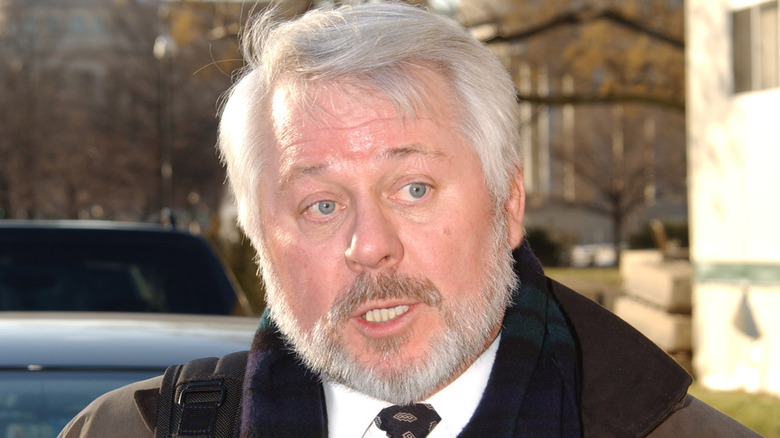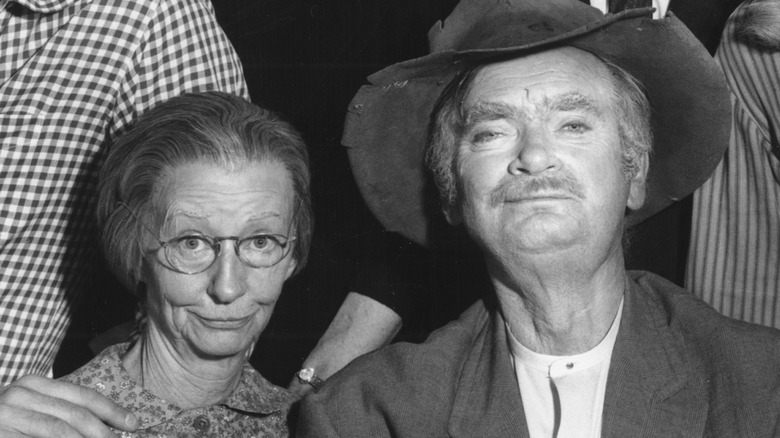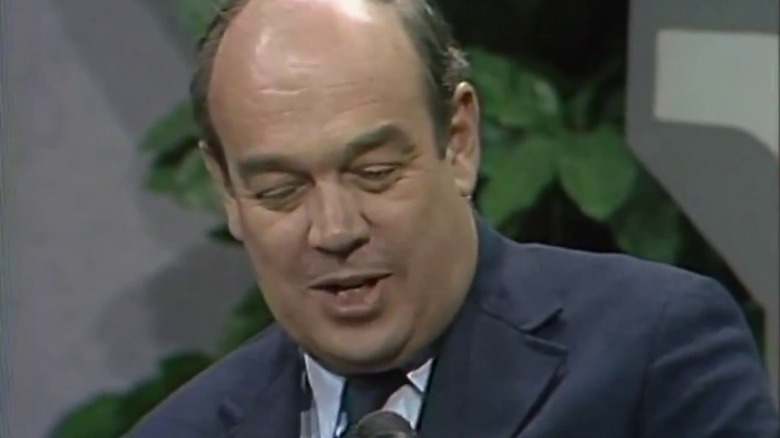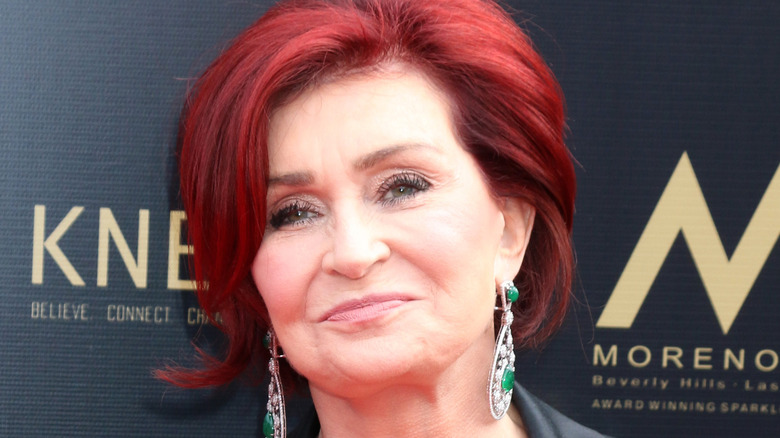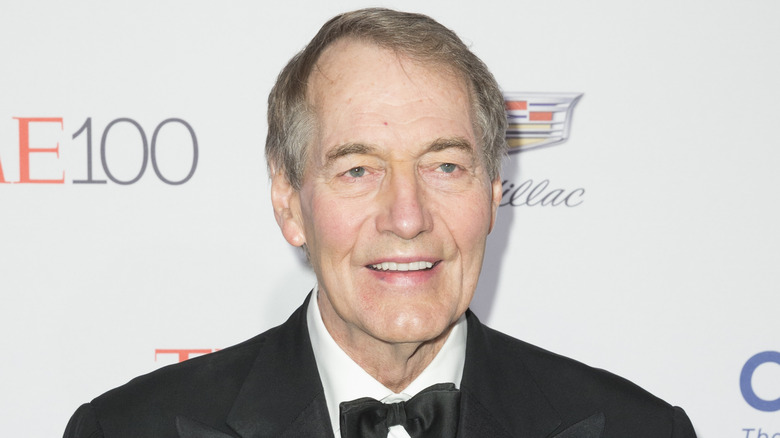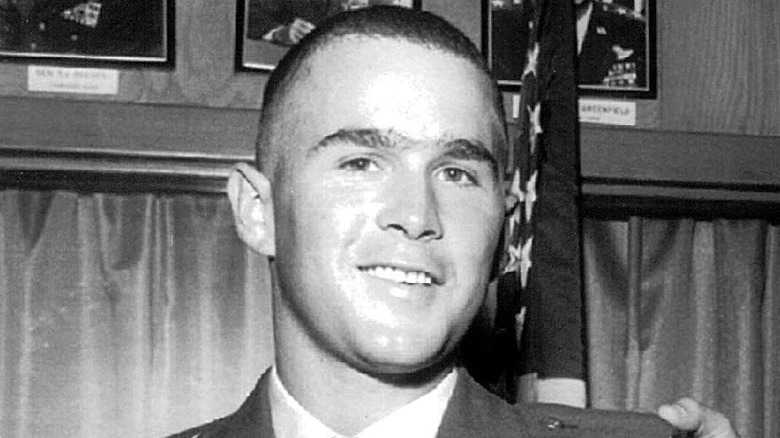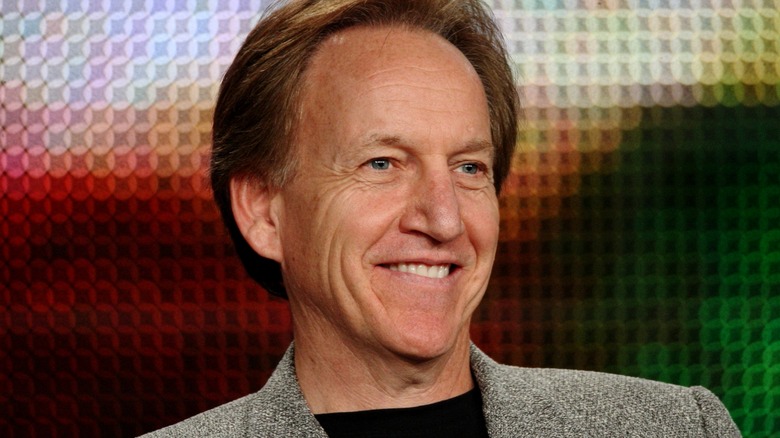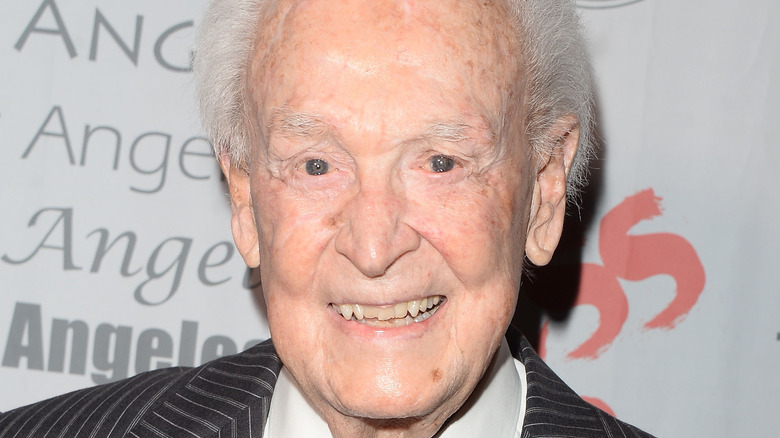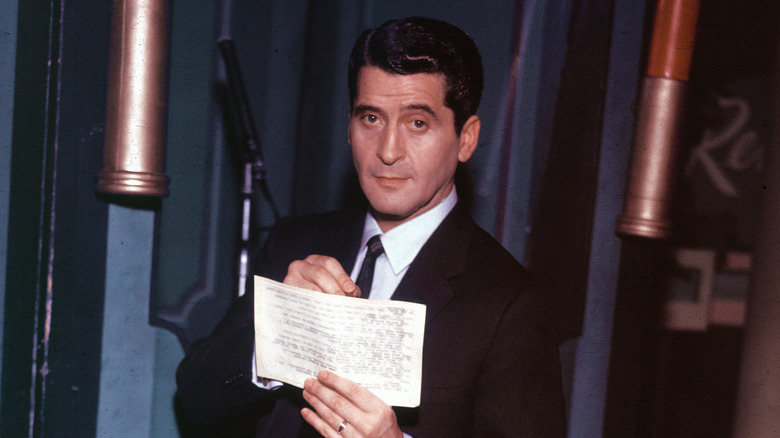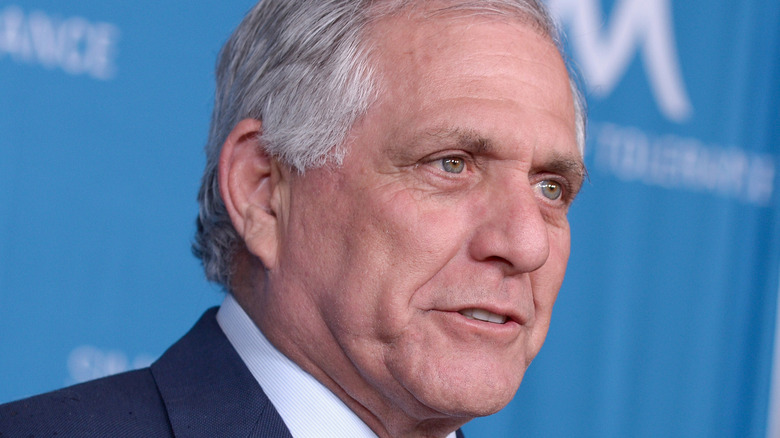CBS' Biggest Scandals Ever
The following article includes allegations of sexual harassment, sexual assault, and workplace misconduct.
Still one of just a handful of national, advertiser-supported, over-the-air free broadcast channels in the United States, the Columbia Broadcasting System — or CBS — began as a radio network in 1929, before giving pictures with sound a very successful try in the 1940s, per The Saturday Evening Post. In its early years, CBS promoted itself as a destination for all kinds of entertainment, from serialized dramas (or "soap operas") in the daytime to a variety of programs in the evening, plus a separate news division — earning the company the fancy nickname, "The Tiffany Network."
Over the years, CBS has aired some of the most popular and enduring works of television, including "I Love Lucy," "M*A*S*H," "Magnum, P.I.," "Everybody Loves Raymond," "The Big Bang Theory," the "NCIS" franchise, and "The Late Show." But when one broadcaster hires so many people and creates so much product, it's bound to generate or attract controversy. Here are all of the most salacious, embarrassing, and alarming scandals in the long history of CBS.
An actor died on the set of a 1980s CBS drama
CBS' answer to NBC's hit, "Remington Steele," a show about a debonair thief-turned-international detective, was "Cover Up" — an action drama starring Jon-Erik Hexum as Mac Harper, an elite military agent who was also a spy and also a male model. According to Entertainment Weekly, the filming of an early Season One episode in October 1984 was plagued with delays. Hexum took a nap to make some time go by, and upon waking up, found out that the crew still wasn't ready to let the cameras roll.
He reportedly grabbed a prop gun and held it up to his head, implying that he was so bored that death would be a welcome respite. "Can you believe this crap?" Hexum said, and then pulled the trigger, apparently not thinking that the prop gun would pose a danger. Unfortunately, although the weapon was loaded with a blank, the discharge still sent a bone fragment into Hexum's brain, causing severe hemorrhaging. The actor was quickly dispatched to Beverly Hills Medical Center, where doctors performed a five-hour brain surgery. Tragically, Hexum never awoke from his coma, and after he was pronounced brain-dead, he died six days after the on-set accident.
CBS continued on with "Cover Up," with writers explaining that Mac died off-screen, and new recruit Jack Striker (Antony Hamilton) replacing him. The show was cancelled at the end of the 1984-85 season.
CBS fired the star of a hit show because she wanted to have her baby around
In 1979, the sitcom "House Calls" hit CBS, boasting major star power. A romantic comedy about suave Dr. Charley Michaels and sophisticated hospital administrator Ann Atkinson, who don't want to fall in love but then totally do, starred ex-"M*A*S*H" cast member Wayne Rogers and Academy Award nominee Lynn Redgrave. The burgeoning romance between Charley and Ann came to an abrupt end at the beginning of the show's third season in 1981. Anne was gone, her absence was explained in a letter Charley reads out loud — she'd decided to move back home to England.
The real reason for Ann's departure was because Redgrave left the show after two seasons following prolonged tension with Universal Television, the company that produced "House Calls." Universal told People that it had let Redgrave out of her contract after she had asked for a doubling of per-episode salary (from $16,250 to $35,000, far less than what Rogers received) and rejected a handsome counter-offer.
But according to John Clark, Redgrave's husband and manager, the studio just didn't want to deal with Redgrave's demands: She'd just given birth to a baby and wanted to have her on-set to keep up with a breastfeeding schedule, and for the studio to provide a place for that to happen, as well as a driver and nurse on the premises. Universal said no, so Redgrave walked.
When Dan Quayle went after a CBS sitcom star
"Murphy Brown," a show about an acerbic TV journalist (Candice Bergen) who spoke truth to the powerful, hit CBS in 1988 — just days after the election that made 41-year-old Indiana Senator Dan Quayle the Vice President of the United States. Young, relatively unknown, and perceived as bumbling, "Murphy Brown" writers targeted Quayle with a joke at the VP's expense in every episode as "a mandate in our writers' room," creator Diane English told Yahoo! Entertainment. Show writer Korby Siamis theorized that Quayle's "feelings got hurt" from all the ribbing, and that his remarks about "Murphy Brown" in a 1992 speech equated retaliation.
Delivered just after rioting in Los Angeles — prompted by LAPD officers being acquitted of criminal charges for severely beating Black motorist Rodney King, according to The Washington Post — Quayle spoke at the Commonwealth Club of California and blamed society's problems on the death of "traditional" family values, caused in part by fictional single mother Murphy Brown. Quayle called her "a character who supposedly epitomizes today's intelligent, highly paid professional woman, mocking the importance of fathers by bearing a child alone."
In response, English released a statement. "If the Vice President thinks it's disgraceful for an unmarried woman to bear a child," she wrote, "then he'd better make sure abortion remains safe and legal." Then "Murphy Brown" writers added the feud to the show, airing clips of Quayle's comments as if they were directed in the world of the show to Bergen's character.
When 60 Minutes took on the tobacco industry
"60 Minutes" has exposed and reported on a lot of business scandals in its more than 50 years on the air, but one was so dramatic that it was made into a movie. "The Inside," a 1999 Academy Award nominee for best picture, told the tale of one of the most controversial ordeals in "60 Minutes" history.
In 1995, "60 Minutes" interviewed Jeffrey Wigand, who reported that he'd been fired from his job as a researcher at tobacco company Brown & Williamson after helping to develop a healthier cigarette. According to PBS, multiple tobacco company executives testified to Congress that the nicotine found in cigarettes is non-addictive, but Wigand refuted the idea that Big Tobacco believes that, alleging that Brown & Williamson had long known — in part because of his research — that smoking was very harmful to human health, and also that they'd suppressed that data.
All this got "60 Minutes" into hot water, because when Wigand had departed Brown & Williamson, he'd signed a non-disclosure agreement. Expecting a hefty and legally-justified lawsuit from the tobacco company, executives at CBS ordered "60 Minutes" producers to not air the Wigand interview. It would take The Wall Street Journal uncovering this cover-up of a story about a cover-up in January 1996 to get the information to the public, prompting "60 Minutes" to air the Wigand story a week later.
CBS controversially overhauled its lineup with 'The Rural Purge'
In the late 1960s, CBS programmed a lineup of shows that appealed to an older audience who lived outside of major cities. That slate included westerns like "Gunsmoke," shows set in rural environments like "Lassie," and series centered on non-city slickers, including "The Beverly Hillbillies." Half of the top 30 shows in the 1968-69 season were on CBS, so the network was obviously doing something right and giving the people what they wanted. That is, it was, until it blew it all up in search of a younger, more sophisticated audience with disposable income.
Young viewers, particularly those between the ages of 18 and 50, don't yet have steadfast brand loyalties, making them more attractive to advertisers — and in the late 1960s, people of that age were drawn to shows like "Julia" and "The Mod Squad," which featured diverse casts and were set in cities. CBS' advertisers urged programming chief Fred Silverman to schedule shows like that.
In the beginnings of what TV insiders would nickname "The Rural Purge," Silverman cancelled "Petticoat Junction" in 1970 and replaced it with the urban and urbane "The Mary Tyler Moore Show." It was a hit, and so within two years, CBS also got rid of long-running and still substantial (but older, country-skewing) hits, like "Mayberry R.F.D.," "Hee Haw," "The Jim Nabors Show," "Green Acres," "Lassie," "Hogan's Heroes," and "The Beverly Hillbillies." The last vestige of old-time CBS: "Gunsmoke," cancelled after 20 seasons in 1975.
Charles Kuralt had a double life
Charles Kuralt was one of CBS News' most decorated journalists, covering the Vietnam War, serving as a Latin American correspondent, and hosting "CBS News Sunday Morning" over a four-decade career. But what really made Kuralt special, according to The New York Times, was "On the Road," a recurring series of reports and meditations on hidden and underreported gems of the United States, as well as interesting, regular people. Kuralt visited all 50 states, driving around in an RV to find and file his noble human interest stories.
Kuralt died in 1997, but the following year, the world found out about what else Kuralt was up to while on the road. While married to Suzanne "Petie" Kuralt, Charles Kuralt had kept up a secret, parallel, long-term relationship with a woman named Pat Shannon (whom he'd met while making "On the Road") for 29 years, according to The Washington Post. They'd celebrated holidays together and gone on trips together. Kuralt helped finance Shannon's life, writing her checks that amounted to more than $500,000 over the years and helping put her children through college.
After Kuralt's death, his former wife and his other partner contested the newsman's will in court, fighting over a chunk of his Montana property.
When Sharon Osbourne left The Talk
After Prince Harry and Meghan Markle's 2021 interview with Oprah Winfrey, in which the duchess accused the royal family of racist actions, "Good Morning Britain" host Piers Morgan declared that he didn't believe Markle and walked off the set. According to TMZ, Morgan was criticized of acting in a racist manner. Sharon Osbourne tweeted her support for Morgan, prompting her "The Talk" co-host, Sheryl Underwood, to ask why she'd support such behavior.
"Tell me: What has he uttered that's racist?" Osbourne asked, visibly agitated. "I feel even like I'm about to be put in the electric chair, because I have a friend who many people think is a racist, so that makes me a racist." Osbourne issued a blanket apology on Twitter "to anyone of color that I offended," but ex-colleagues started lining up to report on Osbourne's past problematic words. "I'm old enough to remember when Sharon complained that I was too 'ghetto' for 'The Talk'... then I was gone," Holly Robinson Peete, for example, tweeted. After launching an internal investigation on Osbourne, according to ET, CBS placed "The Talk" on a brief hiatus. Then another "The Talk" alumnus, Leah Remini, told writer Yashar Ali that Osbourne had allegedly used offensive slurs to refer to Chinese American co-host Julie Chen and lesbian co-host Sara Gilbert.
The whole scandal came to an end when CBS announced that Osbourne had quit "The Talk." According to Page Six, the network bought out her contract, reportedly paying her between $5 and $10 million.
Eliza Dushku sued CBS over a sexual harassment incident
Eliza Dushku, a veteran of beloved 2000s cult TV shows like "Buffy the Vampire Slayer," "Tru Calling," and "Dollhouse," made a return to major network television in March 2017, according to The New York Times, inking a deal to appear in three episodes of CBS' first-season hit legal drama "Bull." Producer and writer Glenn Gordon Caron assured Dushku that her character, J.P. Nunnelly, would be more than just a romantic partner for Michael Weatherly's Jason Bull, with tentative plans to have the actor join the regular cast.
Then, one day on set, with many members of the cast and crew present, Weatherly allegedly made some comments about Dushku's appearance, and followed those up with a joke about sexual assault and a suggestive comment about a sexual act. Later on, Dushku approached Weatherly to tell him that she didn't approve or condone his earlier behavior. And then, she alleged, she was abruptly written off "Bull."
For this combination of alleged sexual harassment and wrongful termination, Dushku filed suit against CBS. The parties employed mediation and reached a confidential agreement, in which the network would pay the actor $9.5 million, which is what Dushku would have earned had she been made a full-time "Bull" cast member and stayed on the show for four years.
If you or anyone you know has been a victim of sexual assault, help is available. Visit the Rape, Abuse & Incest National Network website or contact RAINN's National Helpline at 1-800-656-HOPE (4673).
Charlie Rose was accused of harassing dozens of women
A veteran newsman and host of a PBS talk show, Charlie Rose also worked for CBS News as the anchor of "Nightwatch" in the 1980s, and later as a "60 Minutes" correspondent and a co-host of "CBS This Morning." Rose was also one of the focal points of the early #MeToo movement.
In November 2017, The Washington Post reported claims from eight women of Rose's improper and unwanted actions of a sexual nature between the years of 1990 and 2011. Among the charges: Rose allegedly made "lewd phone calls," exposed himself, made unwanted advances, and groped the women. Rose responded via a statement on Twitter. "Claims have been made about my behavior toward some former female colleagues," he wrote in part. "... I have behaved insensitively at times, and I accept responsibility for that, though I do not believe that all of these allegations are accurate. I always felt that I was pursuing shared feelings, even though I now realize I was mistaken."
Immediately after the Post report, according to the Associated Press, CBS News suspended Rose from both "60 Minutes" and "CBS This Morning." Then, after three more women, all who had worked at CBS News, alleged improper conduct on Rose's part, CBS terminated the journalist's contract and fired him, per CNN. Unfortunately, the story wasn't over. The Washington Post published another extensive report on Rose in May 2018, in which 27 women, including 14 CBS News employees, levied sexual harassment claims, dating from 1976 to 2017.
If you or anyone you know has been a victim of sexual assault, help is available. Visit the Rape, Abuse & Incest National Network website or contact RAINN's National Helpline at 1-800-656-HOPE (4673).
60 Minutes didn't confirm its sources before airing a report on President George W. Bush
In September 2004, according to The Baltimore Sun, the Wednesday edition of "60 Minutes" aired a bombshell of a story. The presidential election was just weeks away, and "60 Minutes" presented documents which allegedly revealed that George W. Bush, seeking a second term as president, had been suspended from service and declared unfit for duty while in the employ of the Texas Air National Guard decades earlier.
Journalist Mary Mapes, reportedly a thorough and widely respected journalist, produced the segment, having received the documents from a retired Texas Air National Guard officer, who had obtained them from another officer — who, in turn, received them from Lt. Col. Jerry Killian, the alleged author of the documents who had died in 1984. It would turn out that Mapes had failed to properly vet or authenticate the documents, which were riddled with incorrect abbreviations and used a typeface almost nonexistent in the 1960s. As the news of more flaws in the documents spread, "60 Minutes" stood by the report for two weeks before finally recanting.
In the wake of the major reporting snafu, CBS hired an independent news watchdog panel, which found that in speeding to scoop other news outlets on the affair, CBS News employees had not done their due diligence. Four executives and senior producers, including Mapes, were ultimately fired by the organization.
CBS had to fire a frequently investigated NCIS producer
Brad Kern had been a producer or showrunner on a number of high-profile TV series, including "Charmed," "Beauty and the Beast," and for CBS, "NCIS: New Orleans," joining the show in 2016. In 2017, Hollywood trades, including Variety, discovered that CBS' Human Resources department had conducted two separate investigations into Kern's alleged behavior during his less than one year with the network. One source called Kern a "gender bully" who singled out women for mistreatment, while another claimed he "discriminate[d] about women, against working mothers, against anyone he can't control." Among Kern's alleged misdeeds: uttering sexual remarks about female coworkers, giving unwanted massages, and making racially-insensitive comments.
"We were aware of these allegations when they took place in 2016, and took them very seriously," CBS said in a statement. Kern continued to work on "NCIS: New Orleans," having completed six months of counseling and sensitivity training, according to Deadline. Shortly after he signed a contract extension, per The Hollywood Reporter, Kern was demoted from showrunner to consulting producer, and then suspended in June 2018. According to The Hollywood Reporter, CBS had to open a third investigation on the producer to examine more charges of nasty behavior, harassment, and unprofessionalism. That was all CBS could take, and they broke off all deals with him in October 2018.
The Price is Right host Bob Barker was sued by two of the show's models
"The Price is Right" is a stalwart of daytime television, with very excited audience members asked to "come on down" to Contestants Row and maybe win a new car or a cruise in the Showcase Showdown since 1972. Bob Barker became an institution for hosting "The Price is Right" from its daytime inception until his retirement in 2007, always gently encouraging contestants to win big.
But behind his daily, well-meaning suggestion to viewers to spay and neuter their pets, Barker might not have been such a good guy. In 1994, longtime "Price is Right" product model Dian Parkinson filed an $8 million lawsuit against Barker, according to Time. Parkinson alleged that Barker made her have sex with him or else lose her job on the show, and then she was fired anyway. Barker at first denied everything, then said he'd had a sexual relationship with Parkinson, but that it was a consensual affair. A judge threw out the wrongful termination element of the suit, but allowed the harassment charge to proceed, although Parkinson eventually dropped the whole thing over the severe stress it caused and a lack of money to pay legal fees.
Another "Price is Right" model, Holly Hallstrom, sued Barker and the production in 1995, claiming that she'd been fired for gaining weight and for refusing to disparage Parkinson in interviews. Barker countersued for slander, but a court ruled in Hallstrom's favor.
If you or anyone you know has been a victim of sexual assault, help is available. Visit the Rape, Abuse & Incest National Network website or contact RAINN's National Helpline at 1-800-656-HOPE (4673).
The fix was in on a couple of CBS game shows in the 1950s
One big TV craze in the 1950s was so-called "big money game shows," where contestants answered general knowledge questions in exchange for large sums of money. The most-watched of these shows was CBS' "The $64,000 Question," the No. 1 show on TV in 1955-56, and a top 5 hit the following year, with the spinoff "The $64,000 Challenge," featuring winners from the parent show, ranking in the top 30 — because viewers liked seeing regular people win huge sums of money. $64,000 is the equivalent of $623,000 in 2021, accounting for inflation.
Just before the 1958-59 TV season, another show called "Dotto" abruptly disappeared from the CBS lineup. The reason? The federal government had opened an investigation into the legitimacy of TV quiz shows after evidence surfaced that a "Dotto" contestant had been fed answers ahead of time. According to the Associated Press, the government probe was almost certainly going to look to see if other series were similarly rigged, but the feds were beaten to the punch when a former "$64,000 Challenge" contestant told the press that he'd been "given answers in advance" of his game. That revelation prompted Lorillard Tobacco to pull its sponsorship, and then CBS to pull the show.
"The $64,000 Question" managed to air for a few weeks, but the taint on game shows was hard to escape. Ratings dropped and CBS cancelled the show at the end of 1958.
CBS' CEO Les Moonves left after multiple assault accusations
After working for TV production companies, Les Moonves came to CBS in 1995, where he would hold various executive positions, including president of CBS Entertainment and chairman and CEO of CBS Corp. He guided the network to primetime dominance and was one of the most powerful men in television — and certainly no one wielded more control at CBS than did Moonves. But even major TV executives weren't protected when the #MeToo movement emerged to root out people in the entertainment industry who had allegedly abused their power or used sex as a weapon.
Moonves even advanced #MeToo — according to The New Yorker, he co-founded the Commission on Eliminating Sexual Harassment and Advancing Equality in the Workplace in 2017. But around that time, six former colleagues of Moonves' told investigative journalist Ronan Farrow that Moonves had allegedly made untoward advances at them, including unwanted kissing and aggressive touching. "What happened to me was a sexual assault, and then I was fired for not participating," actor Illeana Douglas alleged. Writer Janet Jones claimed that Moonves forced her to kiss him at a meeting. In all, 30 former or current CBS employees admitted to witnessing or having knowledge of Moonves' actions.
In September 2018, CNN reported that Moonves would leave the company. He later sued CBS after it refused to pay out what he claimed was a $120 million severance package, per The New York Times. The suit was settled in May 2021.
If you or anyone you know has been a victim of sexual assault, help is available. Visit the Rape, Abuse & Incest National Network website or contact RAINN's National Helpline at 1-800-656-HOPE (4673).

